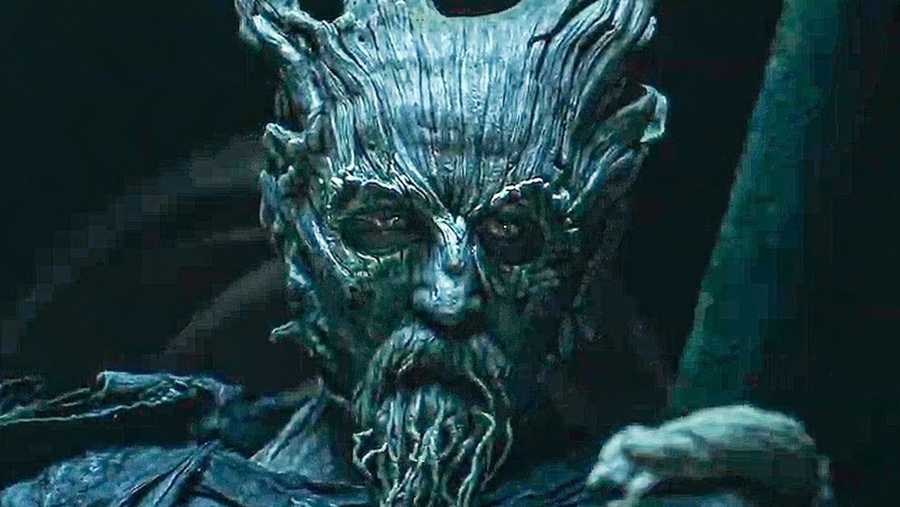Wednesday
I had been resisting watching the recent Sir Gawain and the Green Knight—I’m invariably disappointed when I watch my literary loves translated to celluloid—but when the movie popped up in the menu during our return flight to America, I said, “What the hell.” I’m still trying to wash the memory from my mind.
I didn’t just dislike it. I hated it. With the burning fury of ten thousand suns. Today’s post explains why.
I must acknowledge that the filmmaker faced an impossible task. SGGK is a poem of breathtaking complexity, one of my five favorite works of all time. It is, first of all, a profound meditation on our relationship with death, composed by a poet who had either first-hand or second-hand experience with the Black Plague. Paradoxically, it is also a comic masterpiece. Key to the story is the figure of the Green Knight, who is both a death-dealing giant and a laughing, fairly reasonable, all-green visitor offering Camelot an evening of entertainment. How does a filmmaker capture that mixture?
The answer: he didn’t and perhaps couldn’t. Instead, we get a joyless drama with a mute monster and a knight fearing for his manhood. In the end, it’s unclear what Gawain has achieved.
Here’s how I interpret the poem. King Arthur’s Court thinks that it has arrived at a couple of failsafe ways for dealing with death. One is its Christian belief system, with its promise of life after death. A second is its knightly code, with its belief that a knight will attain glory if he sacrifices his life for king and country.
A suspicion of sensuality, especially of sexuality, also works its way into the mix. An ideal knight should be like Galahad or, to choose a non-fictional knight, the 15th century’s Chevalier de Bayard, who was “sans peur and sans reproche” (without fear and above reproach). The poem invokes this ideal, with its Gawain (unlike the Gawain in the movie) rejecting sexuality.
Green Knight represents a challenge to this value system. A Green Man figure from pagan lore who, like nature, can regenerate himself (the movie at least gets this part right), he doesn’t agree with anything that denigrates the delights of nature. His mission is to determine whether these people, at their core, really have the contempt for life that they claim to. Gawain seems to calmly shrug off death as he rides out to receive the return axe blow, but does he really believe this or is he in denial. The poet wants to know this as well.
In other words, the series of tests that Gawain undergoes in the Green Knight’s castle (Gawain doesn’t know that Lord Bertilak is the Green Knight) are to determine whether Christian knighthood has in fact found a way to rise above nature. Gawain gets a full of blast of nature at its most intense, which is to say sex and death. He is tempted by a woman’s beauty and he is shown death in all its grisly detail (the dead animals that the lord of the castle brings home each day). While he resists the temptations and fears of the flesh to a point, in the end he surreptitiously accepts a life-saving sash from the lady. When all is revealed, as GK points out, Gawain cares for his life after all.
GK has no problem with this. As he sees it, it’s only natural. Gawain, however, is appalled at himself for what he regards as his cowardice, and the movie seems to agree with him. It seems upset when he runs away from the Green Knight and proud of him when returns. In other words, it buys into the very value system that the poem is questioning.
As I see it, the poem thinks that Christianity has so demonized nature that a rebalancing is necessary. A delightful and humorous tale, the poet figures, is the best way to restore perspective. After all, everyone is so damned serious about their Christian beliefs and their focus on the afterlife that they are forgetting to enjoy the life that is before them. They refuse to admit that earthly delights, including sex, are a gift not to be spurned.
Forget about delight and humor in the movie. Instead we watch Gawain torn apart by his death fears before achieving (I think) some kind of peace. To be sure, the Gawain in the poem never reconciles himself with his natural urges, but it’s in the overall context of the knight’s laughter. The poem’s Gawain could tread a more balanced path if he chooses.
And a thought on the knight. There are stories where our fear of death is so great that death manifests itself as a monster. Take Edgar Allan Poe’s “Masque of the Red Death,” for instance, where death stalks the partying aristocrats one by one. The poem gives us a healthier vision of sex and death, which is one reason I love it so much. There we see Death—and his consort Sexuality—as provocative, tough-love instructors.
The film, on the other hand, takes all the fun out of the story.


